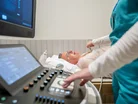AI Tech 'can Predict Heart Attacks Decade Before Symptoms'

Cardiovascular disease risk prediction specialist Caristo Diagnostics has published a clinical study that shows AI can identify patients at risk of a heart attack up to 10 years in advance, even when they were deemed healthy by current diagnostic methods.
The study, published in one of the most esteemed peer-reviewed journals, The Lancet, involved over 40,000 patients, includes a number of eye-catching findings.
Notable among these was that coronary inflammation measured by the AI tool predicted fatal and non-fatal cardiac events at least 10 years in advance.
Also, among patients undergoing coronary CT scans – the first-line test for chest pain – 80% did not have obstructive coronary artery disease at the time of imaging, but twice as many fatal and non-fatal cardiac events occurred in that group.
Caristo’s CaRi-Heart technology marks a scientific breakthrough that is radically transforming the traditional approach to heart disease prediction, prevention and management.
The technology applies advanced AI algorithms to routine coronary computed tomography angiography (CCTA) scans to visualise and quantify coronary inflammation, the otherwise invisible disease mechanism responsible for many fatal heart attacks and strokes.
AI-driven health risk tools on the rise
The study highlights the power of AI-driven risk prediction tools that can identify vulnerable patients with inflamed coronary arteries, particularly in those without obstructive CAD.
The technology has the potential to transform CCTA from a test used to triage a minority of patients for further intervention into a prevention tool that guides management for all patients undergoing CCTA.
“The study is an expanding global registry which will include long-term clinical and outcome data for 250,000 patients from around the world, and we are very pleased to publish these initial results,” said Keith Channon, MD, Professor of Cardiovascular Medicine at the University of Oxford, and Caristo’s Chief Medical Officer.
He adds: “Coronary inflammation is a crucial piece of the puzzle in predicting heart attack risk. We are excited to discover that CaRi-Heart results performed exceptionally well in predicting patient cardiac events. This tool is well positioned to help clinicians identify high-risk patients with seemingly ‘normal’ CCTA scans.”
Study co-author Ron Blankstein MD, Professor of Medicine & Radiology at Harvard Medical School, said: “This study represents one of the largest undertaken in the field of CCTA, and has important implications for the field of preventive cardiology.
The study is the latest in a raft of AI-based healthcare solutions being trialled in hospitals and clinics.



